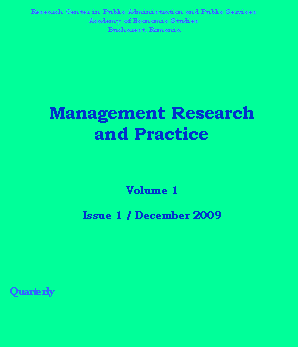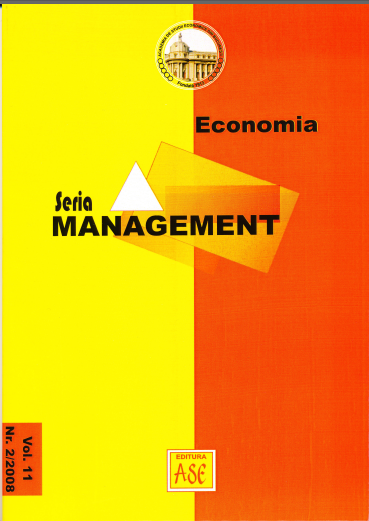
BUSINESS EXCELLENCE AND MANAGEMENT
ISSN
2248-1354 (print)
2668-9219 (online)
ISSN-L: 2248- 1354
|
Home |
|
| Journal description | |
| Aims and scope | |
| Publication ethics | |
| Indexation | |
| Editorial information | |
| Editorial team | |
| Editorial Board | |
|
Journal content |
|
| Current issue | |
| Previous issues | |
| Special issues | |
| Guideline for authors | |
| Submission | |
| Manuscript style | BEMAN Template |
|
|
| Volume 3, Issue 3, September 2013 |
|
1. TOWARDS AN UNDERSTANDING OF THE IMPACT OF TQM IN FIRMS IN SOUTH EAST EUROPE – A QUALITATIVE APPROACH
Shpend IMERI |
|
The study focuses on the understanding of the impact of Total Quality Management (TQM) in firms in South-East Europe (SEE). One hundred structured in-depth interviews were conducted with a mixture of firms in SEE, mainly with middle and top level managers. The main fact of the study is that regardless that firms in this region know about the acronym TQM and some of them are familiar with some principles and practices, actual familiarity with the ‘soft’ elements is seen superficial, and they have poor understanding regarding it. Therefore, it can be noted TQM is this SEE firms is neither resisted nor directly accepted, rather they tend to see it from a technical aspect, being familiar and understanding only the essential of its ‘hard’ elements. ... |
|
2. AN ECONOMIC ANALYSE OF THE HEALTH AND SOCIAL SECTOR RECASTING IN FRANCE AND ROMANIA
Philippe DUEZ
The Bucharest University of
Economic Studies, Bucharest
The Bucharest University of
Economic Studies, Bucharest
|
|
Many reforms are based on the recasting of health and social sector in France and Romania. The two countries do not have the same needs but what they have in common is the need to transform the role of the state. The economic analyse of law allows us to offer an interpretation of these transformations. First of all, this article shows that the two states seek the regulation mode best adapted to their health and welfare system but they rather turn to a subsidised and territorialized regulation. It then shows that in order to ensure public services of general interest in the field, they are interested in using arranged lump sum contracts. ... |
|
3. POLICE TRAINEES & STRESS: A STUDY WITH SPECIAL REFERENCE TO KERALA ARMED POLICE IVTH BATTALION, KERALA, INDIA
Suraj Kushe SHEKHAR |
|
Stress is an integral part of Police personnel. This paper focuses on stress among Police Trainees and identifies the factors causing stress along with the strategies adopted to reduce the stress. Descriptive research with judgmental sampling technique was employed to select a sample of 65 Police Trainees in Kerala Armed Police IVth battalion, Kerala, India. Findings revealed that ‘Pressure from the instructor’ (β =.786), was the prime cause of stress .It was also found that ‘Low salary’ (β = -.144), was insignificant as a cause of stress. Regardless of the source of stress, most Police Trainees used variety of sensory pursuits to manage stress. The positive sensory pursuit followed by the trainees was exercise (63%), followed by outings (37%) on weekend days and then TV/ music. Multiple regression analysis, ANOVA, t test etc were used to interpret the results. ... |
|
4. GENERAL UNION OF INDUSTRIALISTS OF ROMANIA AND THE MANAGEMENT IN INDUSTRY
Ion VOROVENCI |
|
General Union of Industrialists of Romania (AGIR) was a representative institution which aimed to support Romanian industrialists in the country's economic development. The Romanian economy had reached a certain level, the current favorable to the industrialization had also penetrated here, given the fact that Romania had huge resources, warning a number of foreign investors. A group of industrialists, almost all educated in the West, understood to develop the most diverse industries, particularly those related to a specific tradition, given the diversity of raw materials for safekeeping. The political struggle, carried out to promote the industry, was not devoid of contradictions between the „agrarians”, who considered Romania a country eminently agricultural, on the one hand, and the promoters of industrialization, on the other hand. Industry superiority eventually defeated the former. In 1938, the year of peak economy, Romania had an industry that had come to equal, in terms of the share of the national income, agriculture. ... |
|
5. A STRATEGIC MANAGEMENT MODEL FOR SERVICE ORGANIZATIONS
Andreea ZAMFIR |
|
This paper provides a knowledge-based strategic management of services model, with a view to emphasise an approach to gaining competitive advantage through knowledge, people and networking. The long-term evolution of the service organization is associated with the way in which the strategic management is practised. ... |
Other ASE journals


